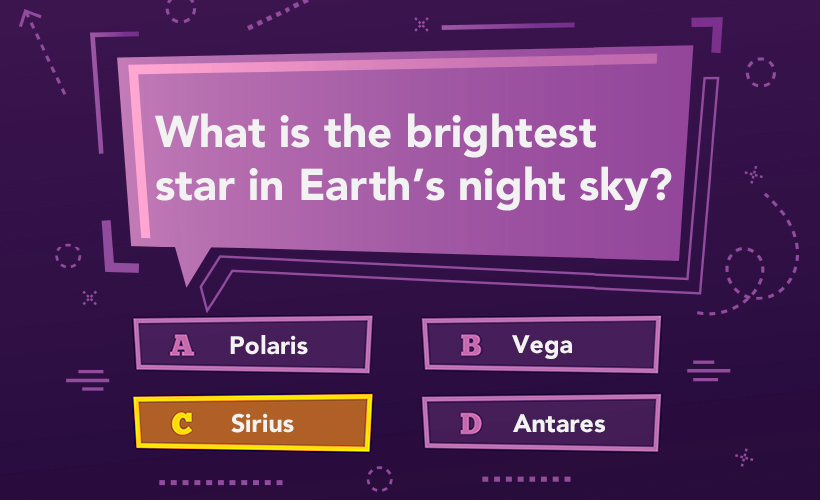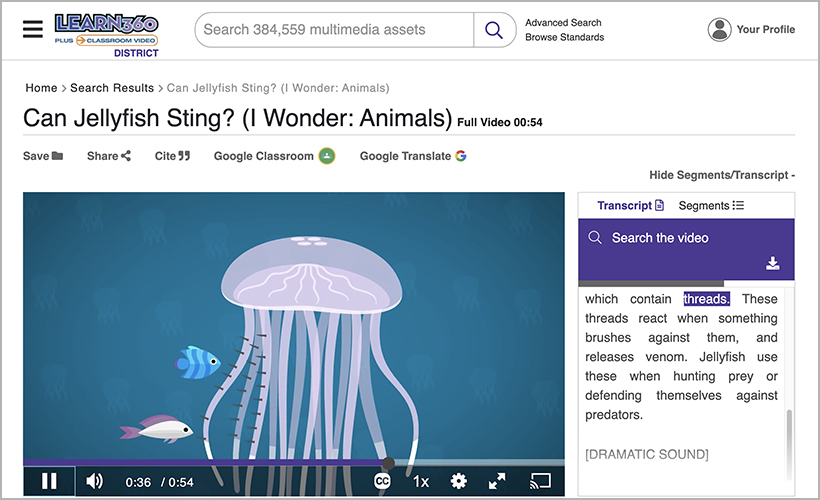What day does the Spring Equinox land on? How long did the U.S. Civil War last? What was the name of the first woman in space? Trivia games aren’t just fun—they are also exercise for the brain, great for improving memory as well as problem-solving and critical-thinking skills.
If you’re looking for a fun way to quiz your students while teaching them research skills, try asking them trivia questions and then let them search Infobase’s databases for the answers. To increase the challenge, offer bonus points for speed or establish a “no searching” rule to encourage them to find the correct answers by browsing. Here are some ideas on what questions you can ask.
Questions for Elementary and Intermediate Students
The World Almanac® for Kids Elementary and The World Almanac® for Kids cover a wide range of curricular topics for middle school and elementary students. Each database features a special trivia question on the homepage as well as Fun Facts articles and games including word searches and crossword puzzles. The World Almanac for Kids also features an interactive, SMART Board-friendly Trivia Challenge that can be used in class to enrich lessons across the curriculum or as an engaging introduction to new topics. The Trivia Challenge can be found under Teacher Resources on the platform.
Questions you can ask with The World Almanac for Kids Elementary:
1. What kind of camouflage does a shark have?
2. What is the capital of Prince Edward Island, Canada?
3. What is the tallest land mammal?
4. What do you call a clock that has a clockface and moving hands?
5. What is the national bird of the United States?
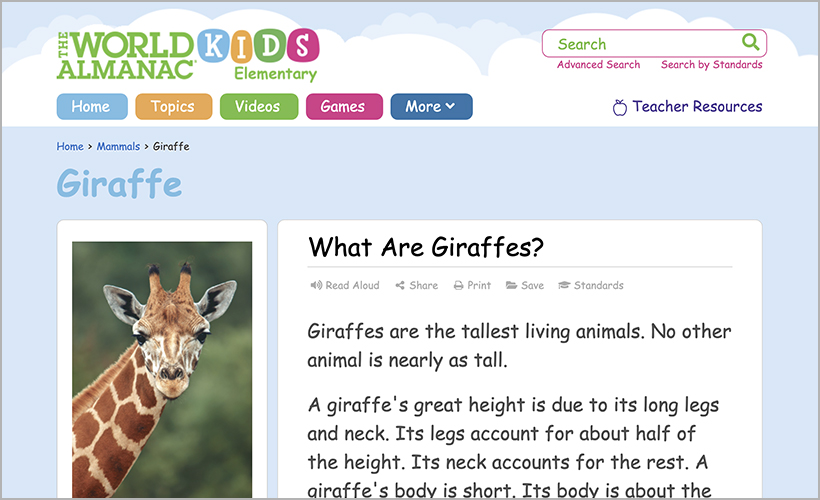
(Answers: 1. Countershading. 2. Charlottetown. 3. The giraffe. 4. An analog clock. 5. The bald eagle.)
Questions you can ask with The World Almanac for Kids:
1. What is the state motto of Vermont?
2. In which U.S. national park can you find Mauna Loa, an active volcano?
3. When was the planet Mercury first discovered?
4. What are the three layers of skin?
5. In what Pennsylvania town was Taylor Swift born?
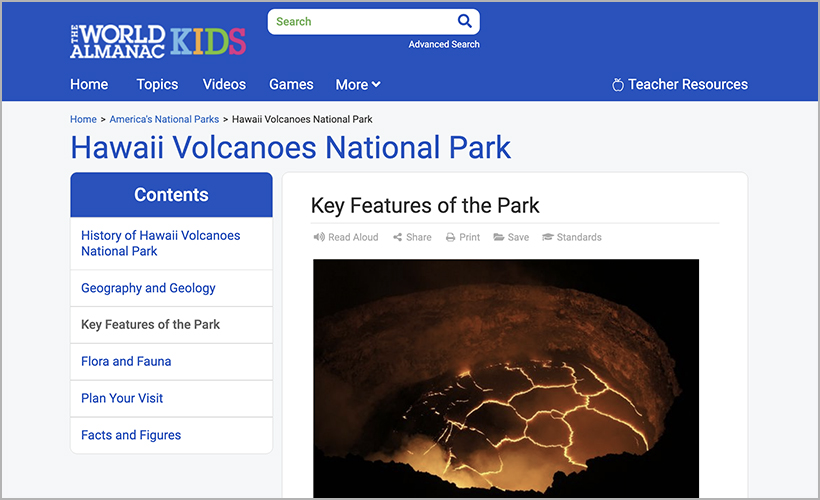
(Answers: 1. “Freedom and Unity.” 2. Hawaii Volcanoes National Park. 3. Around 3000 BCE. 4. The epidermis, the dermis, and the hypodermis. 5. Wyomissing.)
Check Out Learn360 for Fun Facts in Streaming Media
If you’re looking for fact-based media content to round out a trivia game, check out Learn360, the ultimate streaming multimedia resource for K–12 schools. Use these three fun and informative series to ask a question and then let students watch the video to see if they know the answer:
- The I Wonder video series from Educational Voice Ltd., on topics such as history, STEM, shapes, weather, dinosaurs, the environment, and more. Find answers to questions such as “What Is Biodiversity?” (Item #286765), “Who Invented Paper?” (Item #291077), “Did Aztec Children Go to School?” (Item #290979), and “Can Jellyfish Sting?” (Item #289294).
- The All the Answers video series from Sabbatical Entertainment, a fun, fast-paced show that dives into interesting topics of all kinds, including “Solar System, Light Bulb, Chemical Reactions!” (Item #288579), “Bicycles, Butterflies, Meditation!” (Item #288582), and “Gravity, Black Holes, Rainbows!” (Item #288588).
- The Untold: Things You Didn’t Know Explainers video series from Makematic (Item #238951), a collection of short, compelling history videos and animations designed to engage audiences in a new conversation and shine a light on the stories that don’t always make it into the classroom. Learn “How Teddy Roosevelt Saved Football” (Item #281886), about “Greenbrier Resort: The Secret Nuclear Bunker” (Item #285566), about “Harriet Tubman: Civil War Spy” (Item #281888), and more.
- And much more!
You’ll also find Learn360’s Topic Centers, featuring specially selected, ready-to-use content—including videos, interactives, audiobooks, and printables—on core subjects such as science and math, social studies, literacy, and community building.
Questions for High School Students
An ideal source for educators who want to teach students how to research as well as provide them with a trustworthy source, Credo Source combines premier reference content and research skill-building tools on a simple instruction-friendly platform. Students can explore the Mind Map, an interactive tool that encourages students to explore new topics they hadn’t considered when they started their research. Plus, Credo Source allows for the seamless integration of federated search results from your library’s licensed e-resources, encouraging students to dive deep into their topics.
Questions you can ask with Credo Source:
1. Who first coined the term “artificial intelligence”?
2. Who invented Coca-Cola in 1886?
3. How many home runs did Hank Aaron have by the end of his career?
4. In what year was Atlas Shrugged published?
5. Which labor activist co-founded the United Farm Workers alongside César Chávez?
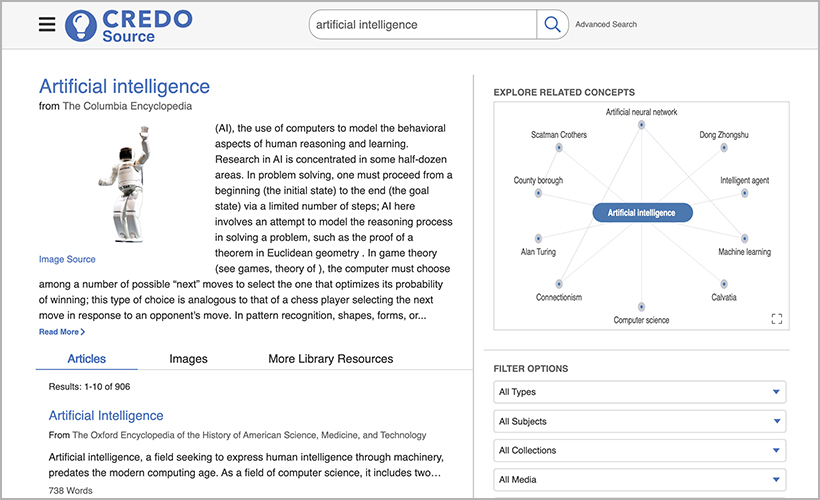
(Answers: 1. John McCarthy. 2. John Pemberton. 3. 755. 4. 1957. 5. Dolores Huerta.)
History Questions
Infobase’s history databases—including American History, African-American History, American Indian History, Ancient and Medieval History, and Modern World History—are each curated to include reference articles, maps, illustrations, and thousands of primary sources, organized into research-friendly Topic Centers that make it easy to find everything you need on that specific subject.
Questions you can ask with Infobase’s history databases:
1. What year did George Washington die?
2. Which Native American political activist founded the National Council of American Indians in 1926?
3. What legendary rock ‘n’ roll guitarist started a band called Jimmy James and the Blue Flames in 1965?
4. Which political philosopher penned The Rights of Man, a two-part pamphlet written in 1791 and 1792?
5. How long did the Qin dynasty last?
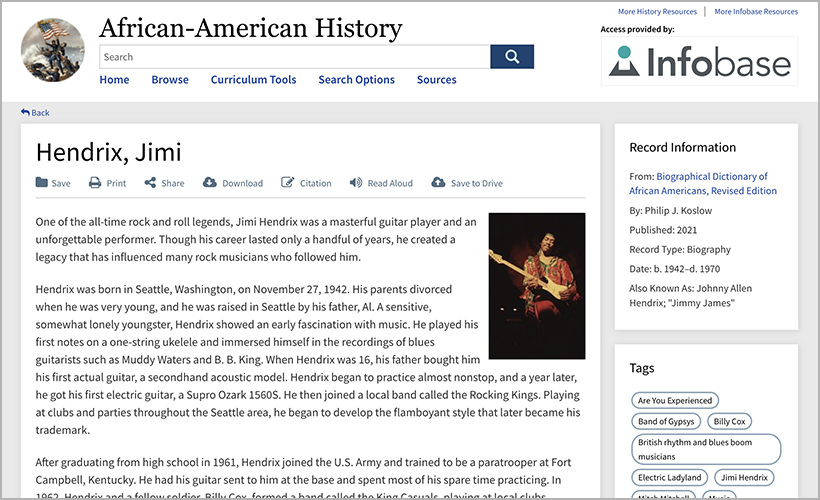
(Answers: 1: 1799. 2. Zitkala-Sa. 3. Jimi Hendrix. 4. Thomas Paine. 5. 15 years, from 221 to 206 BCE.)
Literature Questions
Bloom’s Literature is the only truly student-oriented and multimedia literary database—the definitive source for literary analysis, criticism, and research guidance. It offers reference articles, performance videos, author interviews, podcasts, full-text literary works, and more, all covering literary subjects that range from frequently studied authors and works to multicultural classics to contemporary literature.
Questions you can ask with Bloom’s Literature:
1. In what year was Mary Shelley’s Frankenstein published?
2. Allen Ginsberg, Jack Kerouac, and William S. Burroughs were associated with what literary movement?
3. What Florida town was Zora Neale Hurston’s childhood home?
4. In what town is To Kill a Mockingbird set?
5. What was the name of William Shakespeare’s mother?
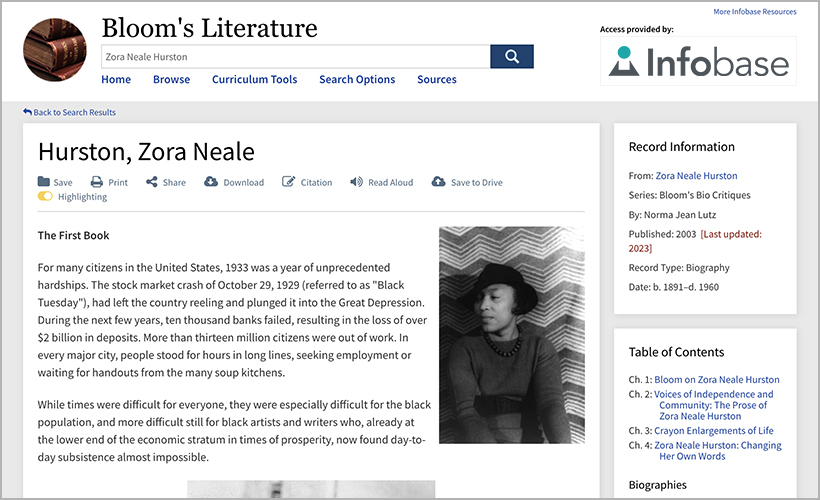
(Answers: 1. 1818. 2. The Beat movement (or Beat generation). 3. Eatonville. 4. Maycomb, AL. 5. Mary Arden Shakespeare.)
Science Questions
The award-winning Science Online offers a comprehensive overview of a broad range of scientific disciplines organized to help facilitate STEM research and learning. Topic Centers feature specially selected content on core science disciplines to help students find a starting point for their research.
Questions you can ask with Science Online:
1. What 19th-century countess is widely considered to be the world’s first computer programmer?
2. In what year did William Harvey describe the circulation of the blood?
3. What is the brightest star in Earth’s night sky?
4. The world’s first oceanographic expedition took place on what ship from 1872 to 1876?
5. What 19th-century physicist and chemist discovered electromagnetic induction?
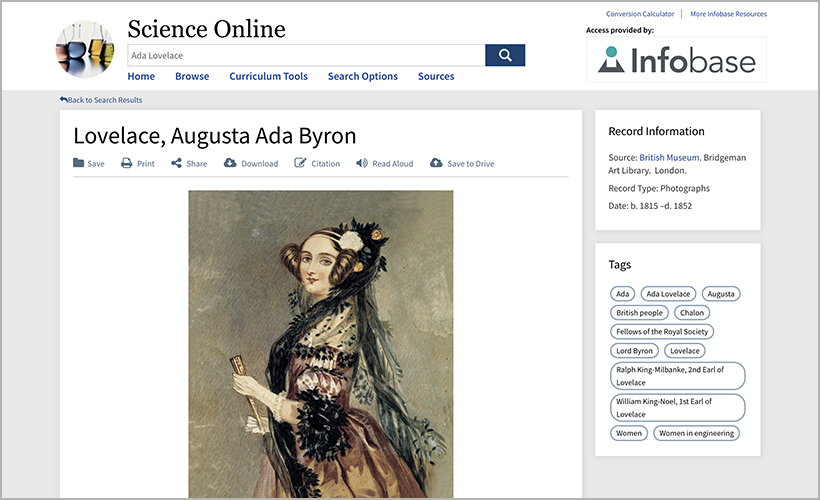
(Answers: 1. Ada Lovelace. 2. 1628. 3. Sirius. 4. The HMS Challenger. 5. Michael Faraday.)
Subscribers, log in today to these databases and Learn360 to start your own trivia game!
Not a subscriber? Why not take a FREE trial today?
See also:
- FREE webinar: Credo: Smart Research Starts Here
- Using Learn360 in the Classroom: Literacy Guide: PDF
- Four Keys to Using Credo Source in Instruction: A Guide: PDF
- Learn More about Holidays Around the World with Infobase
- Celebrate Shakespeare with Bloom’s Literature
- For Science Content, Nothing Eclipses Infobase


